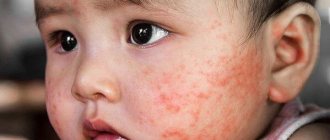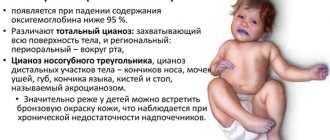The question of why the child fights begins to worry parents quite early - the first manifestations of aggression on the part of the baby can be observed from the age of six months. The next “wave” of aggression occurs at the age of 1.5-2 years. There are quite objective prerequisites for this, related to the developmental characteristics of the baby’s psyche and his upbringing.
Brawlers from the cradle
Every family in which children grow up can tell more than one story about how kids spanked their mother or grandmother in the face with their tiny hands.
The sweet palm was most often covered with tender kisses, and soon everything was repeated from the beginning to the touching exclamations of all household members. Why does a child do this, because no one taught him this? What can be done to ensure that such an incident does not happen again? Young children cannot always understand the meaning of words addressed to them, but they understand intonation very well. The correct tactic for adults is to take the child’s hand away and firmly explain that this is not possible!
If a one-year-old baby, having barely gained freedom of movement, fights with his parents due to numerous prohibitions, you need to look for the reason in another plane. Apparently, the reason for aggression is that such an interesting world becomes inaccessible due to mom and dad’s “no” rules.
Causes
Evgeny Komarovsky reassures young mothers that child fights with parents and peers are a common occurrence. According to him, four out of ten children hit their parents at least once. In two cases, the child becomes a real tyrant.
There are several reasons for this behavior:
- insufficient speech development;
- adult attention deficit;
- nervous or psychiatric disorder.
The fact is that before the age of two, a child beats his parents as an experiment. This is how he learns the world’s reaction to his aggression. He is simply not able to control his emotions yet. After two years, these are conscious actions with a goal.
The baby makes the first “tooth test” in infancy. Mom's breast, rubber nipple, her fist - these are the main objects that experience attacks from tiny biters. There is nothing unusual here, say the mothers. The teeth will erupt and the child will have no reason to bite. This often happens, but not always.
The famous pediatrician Komarovsky wrote that almost all children begin to bite, only some stop their experiments at the first notice, and some have to be weaned from the bad habit for quite a long time.
Why does a small child bite? Most often, unpleasant sensations in the mouth are to blame when a tooth wants to erupt - constant itching, severe irritation, swollen gums. This is probably where the desire to put something into your mouth and bite it comes from, be it your own finger or your mother’s chest, sometimes even your father’s chin.
The child feels the urge to bite, as his swollen and reddened gums simply force him to do so. Buy special teething toys for your child, made of plastic or rubber - let them always lie next to him.
The desire to bite may be associated with the period of teething and the painful sensations from it
It is advisable to alleviate discomfort in the mouth with the help of gels with an anesthetic effect (Kalgel, Kamistad-gel). The problem with sensitive teething persists in a child until he is one and a half years old.
Children aged 1.5-2 years, as a rule, have a limited vocabulary and cannot express their feelings, mood, rage or agreement in words. Very significant incidents may result in an unusual reaction - a bite, even if the impression was pleasant.
Transitional age
A 3-year-old child enters the first transitional age, the awareness of his “I” occurs: “I want it myself,” “I can do it myself.” Any attempt by parents to correct this process is met with protest from the little man: defending his independence, he can use his teeth.
It is worth paying attention to his relationships with peers. Perhaps he has difficulty communicating with them, and the bites are just protection? It happens that such a child not only bites, but also scratches.
In any case, if a child begins to bite regularly, you need to meet with a neurologist or child psychologist and listen to their advice. The psychology of children is more accessible and understandable to them.
It happens that at a very young age, a child’s relationships with peers do not work out; he accumulates suppressed resentment or aggression
Why does he fight, or How to understand childhood aggression
Shutterstock
Fight is an inevitable companion of a children's group. The task of adults is to teach the child to respond correctly to aggression. Family specialist Inna Efremenko tells how to do this on the blog of the Department of Labor and Social Protection of the Population.
Mela newsletter
We send our interesting and very useful newsletter twice a week: on Tuesday and Friday
Unfortunately, there are still adults who openly encourage physical violence. We still often hear: “Don’t be a nurse, fight back!”, “Don’t let yourself get hurt!” But most parents are categorically against any manifestation of aggression.
Where does aggression come from?
Any behavior is always a consequence and it has both a superficial reason, for example, “he took my toy,” and an internal one: “I’m upset and offended.” This is a reflection of the state, a message to the partner and a signal for the adult.
Remember that aggression appears in a situation of discomfort and can be associated with overwhelming emotions, a small vocabulary or a lack of habit of dialogue, discussion and agreement. Fights are a stage of development, and conflict is an inevitable part of relationships, necessary for the education of the individual, the ability to set one’s boundaries (rules) in a high-quality and timely manner, to be aware of feelings and emotions, to be able to voice and defend them.
The child is fighting: what to do?
Many adults, finding themselves in a situation where a 1-year-old child is fighting, wonder: what to do? More recently, he was a cute baby, causing affection when he tried to grab his mother’s hair or pinch her.
Such minor episodes shape the baby’s behavior. If adults do not make comments about this behavior or laugh, then do not be surprised that a little later the baby will become aggressive. By the age of one year, the child gradually develops the habit of hitting his mother in the face, expressing his emotions and desires.
Such behavior should be stopped immediately, gently but persistently intercepting the hand, and explaining in a stern voice that such an action is unacceptable. If the baby continues to be stubborn or ignore, you need to let him off your hands and move away. This will make it clear that the game will not continue while he behaves this way.
Such manifestations of childhood aggression occur a little later. From about the age of two, children with a certain type of temperament (and it doesn’t matter whether they are girls or boys) constantly fight with their peers.
Causes of childhood aggression:
- Undeveloped self-control.
- Inability to establish dialogue with others, lack of vocabulary to express one’s point of view.
- Parents ignoring the child’s attempts to become independent (3-year-old crisis);
- Attempts to attract the attention of constantly busy parents, at least in this way;
- An example of significant adults for whom screaming, threats, and, to be honest, punches are the norm of behavior. Not the best examples of film production and computer game characters add fuel to the fire.
It is difficult to imagine a phlegmatic or melancholic person doing this. But for a child with a choleric type of temperament, such a reaction, combined with the above reasons, is quite predictable.
How to wean your child from aggressive behavior? You need to go from the opposite - do not set an example of resolving conflicts with your fists and shouting, carefully select films and cartoons for your child, teach your child how to resolve conflicts peacefully.
Parental attention to the problems of their child, timely resolution and discussion of conflict situations in kindergarten and in the yard will help to navigate “what is good and what is bad.”
For the most temperamental fighters, the best way out will be classes in the sports section. From the age of 5, a child can seriously engage in team sports, where he will find an outlet for negative emotions.
If you found the topic I touched on interesting, I suggest sharing a link to it with your friends from social networks. I invite you to subscribe to my blog updates in order to learn a lot of interesting things about children and about ourselves, their parents. I wish you health and prosperity, be happy and loved!
Why does a child fight and what should parents do? Advice from a child psychologist
Good afternoon, dear readers! A very large percentage of families seeking consultation come with the issue of child aggression. Why does a child fight, bite, snap? This often confuses parents. How to react to this? What to do about it? We will answer in this article.
I’ll say right away that up to a certain age, trying this behavior is the norm! But if such situations are constant or the child is already over 6–7 years old, then you should seriously think about it.
Have you ever had such a situation when you come to pick up your child from school or kindergarten, and the teacher or educator tells you: “Your child is fighting in the kindergarten, please take action.”
Here, each parent may have different emotions and even completely opposite ones. Someone will feel shame and embarrassment for their child. Someone will feel fear, how is the baby feeling now and what happened to him? In any case, this situation, you see, is not the most pleasant.
We suggest you read: How to understand that a man is jealous but hides signs
Show your child an example of a reasonable response. Restrain yourself and do not scold your child right away! First you need to figure it out and find out what exactly happened.
It is very difficult to understand a situation that you have not seen yourself. Especially if your baby himself cannot tell you everything in detail. For example, he is still very small, the child is 2-3 years old and he still doesn’t speak well, or he doesn’t want to tell you this.
Talk to the teacher or teacher, ask the child himself what happened. Was he defending his toys or was he pushed and he responded? It is necessary to explain the inadmissibility of physical violence, and to show and teach methods of defense using words.
Most likely, your child has already heard everything from the teacher or teacher about his behavior, so do not bring down a barrage of your accusations and punishments on him. He may feel that the whole world has turned its back on him. Acknowledge his feelings and his right to be angry.
It is also important to note - is this a one-time situation (for example, the child might not have calculated his strength in self-defense) or is he often the instigator of quarrels in the team and always uses force as a weighty argument?
Talk calmly, without heated passions, with your child. Imagine yourself in his place, how does your baby feel when you scold him? Especially when something in his life had already gone awry.
Discuss with the educator (teacher) what joint measures you can take to avoid recurrence of such situations. For example, leave a “cushion of anger” in the group and your child, when he gets very angry, can come up and beat it.
On the way to kindergarten, your beloved baby chirped cheerfully about how he would build a tower with his friends and sing children's songs during a music lesson, and in the evening the teacher again complained that he was fighting with the children.
How does the child behave at home? Is his mood subject to sudden changes from cheerful laughter to stormy tears? Does he swing, and maybe even hit his parents or grandmother? If the answers to these questions are mostly positive, then your grown-up baby has reached the age when in this way he is trying to test his strength and determine the limits of his capabilities.
There is no need to make a huge tragedy out of this, but it is imperative to pay attention and respond to such behavior:
- don't let your child hit you;
- looking into his eyes in a clear and calm voice, tell him that you cannot be hit;
- if the child screams and breaks out, repeat these words in the same voice again;
- be prepared for the fact that you will have to react to an incident in this way more than once;
- Think for the future about how to channel such violent activity into a more peaceful direction - play active and loud games with your baby so that he can run around, jump and scream to his heart’s content.
Usually, by the age of three, such aggression already has a different direction and its targets become the child’s peers, and if this time coincides with going to kindergarten, you will have to “work” on this behavior doubly.
Psychologists explain that children conflict with their peers in order to stand out in this way; they are trying to prove that the “last word” remains with them. Here the role of parents should be manifested in full force, because they must clearly explain that this cannot be done, but not just prohibit specific actions, but explain that their dissatisfaction is best explained with words, not fists. Parents must make every effort to ensure that this rule is well understood by the child.
- The mother’s indifferent attitude towards the baby, excessive criticism of his behavior, alienation.
- The desire to earn the respect and approval of the father from the rejected son.
- Too harsh upbringing, in which physical punishment and humiliation predominate as arguments.
- Aggressive behavior of parents who themselves cannot cope with their anger, and therefore cannot teach their child to resolve conflicts with words.
- The child perceives direct ignoring of his aggressive behavior by adults as a kind of “permission” and “encouragement” of his actions.
- Cartoons and TV shows with similar behavior of characters, which the child subsequently begins to imitate.
- Difficulties in interpersonal communication, frequent situations of undeserved punishment or reproach.
- Similar aggressive behavior of peers - the child thinks that such behavior is absolutely normal.
- Age-related crises and related breakdowns, when a child aggressively lashes out at his peers, since he does not yet have experience in conflict-free communication.
Once the cause of excessive aggression has been found, you can begin a systematic struggle to oust it from life:
- Patiently and systematically surround your child with care and love, then anxiety, fear and helplessness will gradually disappear.
- Flexibility and positivity in communicating with peers will appear if parents teach their child communication skills.
- Love, in close combination with reasonable demands, is the right path to victory over childish egoism and whims.
- Reasonably created situations of success will relieve your child of self-doubt.
- Try to rid daily family life of scenes of violence - be it physical punishment, or aggressive scenes in films and television shows, and you will notice how much calmer your child has become.
Explain to your child his feelings: “You’re angry because Sasha didn’t give you the ball.” Show him that you understand his behavior: “Of course, you may be offended and dissatisfied.” There is no need to “remember” good children who never behave like this; the child should not feel guilty for his aggressiveness, because at his age it is quite natural.
It is very important that the family has the most clear and uniform requirements and rules for the baby among all the adults who surround him. For joint games with your child, try to choose activities with clear rules: tabletop, sports, outdoor.
Why does my child always fight?
- Conflict situation in the family . Children feel the atmosphere in the family very subtly. And even if mom and dad don’t quarrel or sort things out in front of the baby, he still feels a tense atmosphere and a hidden conflict
- Health . If the baby constantly feels a feeling of discomfort, the cause of which is some disease. It is necessary to show the child to a doctor, establish the cause and get rid of it. Perhaps the baby has been feeling unwell for a long time and has become so accustomed to it that it has become a normal condition for him.
- Character . Perhaps the child naturally has such a temperament, is quick-tempered, impatient. Here all that remains is to try to correct the behavior, to explain to the baby what is good and what is bad.
- Copying parents' behavior . Watch yourself and your spouse. Perhaps some of you have a short temper. If a child constantly hears his parents constantly yelling at each other, at him, he is constantly in an irritated state. In this case, the baby simply tries to copy the behavior of mom or dad and starts constantly fighting. It has long been noted that aggressive parents often have aggressive children. The solution to the problem is obvious - you need to start changing your behavior and then everything will work out.
- Jealousy. Often after the birth of a younger brother or sister, they get all the attention. The kid finds himself aloof from what is happening for the banal reason “you’re already big.”
- Regular criticism of the child . Often parents forget to praise their baby, do not notice his successes, for them it is a matter of course, the norm of life. But they react negatively and emotionally to any mistake of the child. If you notice such an attitude towards a child in your family, try to improve. It is necessary to learn to react emotionally to the baby, to praise for the slightest achievements, this is very important for the child.
- Lack of attention . A child may have a lot of toys, books, expensive and varied clothes, but this will not replace the most important thing - parental attention. Perhaps parents are busy with business, work, household chores, leaving the child alone with toys. But the baby needs the attention of his parents and he tries with all his might to achieve it, including aggressive behavior. Thus, he will get your attention, albeit with a minus sign. Be more attentive to your baby, spend more time for him. After all, mom and dad are the most important people in a baby’s life.
- Ignoring a child's aggressive behavior . If parents do not react in any way to the fact that the child is fighting, or otherwise displays aggressive behavior towards others (for example, on the playground, takes toys from other children, pushes, sprinkles sand), then this serves as a signal for the baby to that mom or dad encourage him to behave this way. And he continues to act in the same direction. If you notice that your child has started to fight, don’t leave things to chance if you don’t want your son or daughter to grow up to be brawlers.
- Stress. Perhaps your baby has started kindergarten; this is a lot of stress for him. He spent so much time with mom and dad, at home, safe. And now life is completely different - there are no relatives nearby, only unfamiliar children, teachers, rules, routines. Often in such situations, children begin to fight, thus trying to protect themselves from the surrounding reality. Try to understand your baby, give him more time and attention when he is at home, next to you.
- Indulging the whims of a child . Often parents allow their child too much and indulge all his whims. This may cause him to become aggressive in the future.
The following are the main reasons why a child fights. Monitor your child's behavior carefully. After all, from a very early age you can see the character traits that belong to children - fighters. Most of these children show conflict. And in kindergarten they cannot find friends.
And if you notice such behavior and character traits in your child, then you should think about his further upbringing. After all, it is necessary to ensure that aggression is directed only in a peaceful direction. However, this will not be easy, and you must be prepared for difficulties. It is also necessary to follow certain rules of communication to speed up this process.
Effective methods
Child psychologists say that persuasion does not work. Aggression is one of the basic instincts. Pedagogical methods do not bring results with instincts. If it helps, this is an exception to the rule. Simply explaining the problem to a child is a bad method.
It is important to observe the correct reactions to a child’s aggression. Dualism should not be allowed. If mom swears and dad laughs, the child will not understand how to react.
Everything is not entirely clear. In any case, you will have to experiment. Komarovsky, for example, advises turning on the mirror mode - answering the child in the same way. Other experts do not recommend this. But there are steps that you cannot do without. To help your child stop hitting their parents, you should consider the following tips.
All games with an element of fighting and wrestling should be forgotten. There is no need for unnecessary stimulation of motor memory. According to child psychologists, most children already perceive a fight as a game. And if the opportunity arises to “revive” behavior patterns from the game with parents, the child will certainly do it.
The Komarovsky mirror method provides that the parent will not console the child after retaliatory thrashing. The tough response must be consistent until the habit of fighting disappears. But in non-aggressive situations, the mother should still be a faithful helper and comforter.
Children fight when they cannot express what is painful to them. We need to teach the child to express everything that does not suit him. Always look for the cause of dissatisfaction and pull it out. The flow of speech will weaken the anger. The spoken dark thoughts lose their power.
Another way is to walk away from your child when he is fighting. After every aggressive attack.
Without active listening, speaking negatively makes no sense. The child needs to be listened to. You can wean him off from fighting only by giving him enough attention. You just need to listen to your child’s opinion not only in heated situations, but also in life.
Do not be afraid
There is no need to hide your dissatisfaction. The child speaks out the negative, the parent listens. Then vice versa: it’s the child’s turn to listen. This way he will understand the importance of not only his own opinion, but also that of others. Adequate self-esteem has never hurt anyone.
We suggest you read: The unloved daughter, or How to live if your mother doesn’t love you
It is imperative to praise your child for good deeds. At this age, a cause-and-effect relationship is just beginning to be established. Associations with objects and events grow. After good deeds - carrots. The child will understand this and will strive to be closer to the “confectioner”.
Two-year-old child constantly hysterics and hits his mother
Sometimes moms and dads notice how their one-year-old child begins to hit himself on the head or hits his head on the floor or wall. This behavior is typical of children who constantly observe family conflicts. Unable to speak, he hurts himself, expressing his feelings of guilt and resentment in this way.
Parents should control their behavior, avoiding quarrels in his presence. If the emotional family background is stable and the blows do not stop, you should monitor whether the child calms down after receiving attention or the desired object.
Perhaps he is simply manipulating his parents, realizing that his actions help achieve his goal. In this case, you should not make concessions, but, having shown your will, let the child understand that his tricks will not work.
Page content
For a child aged one to three years, the mother is the center of the universe, the dearest and closest person. Joy or indignation, happiness or grief - children convey all emotions and experiences to their mother and only then to other family members.
Psychologists have long found out that the psycho-emotional world of a child is much more subtle than it might seem.
Dad doesn't love mom? Was the child not welcome in the family? Are his parents raising him like a Spartan? Or, on the contrary, are they frantically protective? Any factor can cause aggressive behavior.
- Feeling of uselessness. Children understand perfectly well that they are a burden and a problem for their parents. They read intonations and gestures quickly on a subconscious level. By aggression, a child proves that he has the right to exist in the family as a full-fledged member.
- The relationship is on the verge of divorce. Constant conflicts between parents, clarification of relationships, an unstable situation, disrespectful attitude towards each other make the child suffer and look for a way out. Over time, he can grow into a manipulator with an aggressive pattern of behavior.
- Disrespect for a child. Children feel very strongly if they are constantly put in their place, their requests are ignored, and in a word, they are not valued at all. Aggression is a child’s defense against such an attitude towards himself.
- Total control. There are parents who keep a tight rein on their children. But children perceive this as suppression of the individual and react aggressively. As you know, the best defense is attack.
- Surrounded by care. In a family where mom and dad literally wrap the child in their care, a rather aggressive child can grow up. Why? The child simply becomes spoiled and does not know how to refuse his requests.
- Attention deficit. Busy parents often “brush off” their children or bribe them with expensive toys. The child subconsciously feels that he has been forgotten and begins to behave inappropriately.
- Fear. Anxiety and fear can cause a desire to protest and, as a result, the onset of aggression.
But if you see that the period is dragging on, take action.
A replacement for the sandbox at home can be kinetic sand, playing with cereals (for example, buckwheat) or any bulk materials. At home, you can invite your child to pour cereals from one jar to another, scoop them into a spatula, touch them with their hands, pour them into some water, and so on.
Such activities are great for calming, and at the same time, developing fine motor skills.
The game will amuse you and at the same time enrich your child’s vocabulary.
From time to time, transforming into a lamb, the child will feel much calmer, because the adults in the game help him splash out his energy in the right direction.
In the meantime, this is not mischief at all, but a way to get rid of accumulated anger.
An adult can give meaning to the game if he comes up with a plot. “Indian Fights” or “The Battle of the Brave Pirates” will certainly be of interest to children. An option for playing with a child over one year old could be a playful fight with inflatable hammers.
It has been noticed that over time he will learn to “draw” his outbursts of anger.
- The child is given change. Even a symbolic and weak blow in response only convinces the child of the correctness of the chosen tactics of behavior. He accepts the model as normal and will use it from time to time.
- They pretend to cry. A small child of one or two years old may really like that his actions cause such a reaction in his mother. It cannot be ruled out that the little robber will start beating his mother, so that later he can see her tears. The same applies to strong screams, screams (allegedly from pain), and so on.
- Press shame on such behavior. A child between 1 and 3 years old does not yet understand what shame is, so your words will not be heard.
I am 25 years old, my husband is the same age as me, and my son is 2 years old. The child is developed beyond his years (speaks well, knows a lot, has a developed imagination). For some time now the child began to beat me (quite seriously). To my words that I am hurt and unpleasant, he reacts with even greater aggression.
My husband is a rather gentle person, and I am practically raising the child alone. I love my son very much, I try to caress him at every opportunity. But when we play outdoor games, as soon as he gets a little excited, he tries to either pinch me or hit me (with an angry expression on his face).
published 28/11/2006 13:54 updated 27/02/2017— Miscellaneous
The origins of childhood aggression at the age of about 2 years
Children as young as 2 years old clearly display negative emotions; this is due to a whole range of reasons. Their list includes:
- Insufficient speech development. If a child at 2 years old cannot verbally express his feelings, he resorts to the simplest method - physical influence.
- Lack of self-control and communication skills with other children. A striking example of this is fights between kids over toys. This is directly related to insufficient speech development, since children use blows, bites and pinches to replace verbal communication that is inaccessible to them.
- Need for adult help. If the baby does not succeed in what he is trying to do (draw, build with cubes, etc.), he begins to get angry, disappointed and annoyed. He takes all these emotions out on his parents who did not come to his aid.
- Lack of parental attention. A child provokes a fight with other children, having gained practical experience that such actions will not go unnoticed. The baby needs emotional contact with his parents in order to feel feedback, even if this contact is negative and results in punishment.
- Aggressive behavior of parents and other relatives. Psycho-emotional violence from the outside (with or without the use of physical measures) provokes retaliatory aggression on the part of the child. In addition, this model of behavior is perceived by him as normal, and the child begins to behave accordingly when communicating with peers.
- Watching cartoons and films with a lot of aggressive actions. Children begin to copy the behavior of the heroes, not yet distinguishing between what is good and what is evil, not understanding the pain of others.
What to do if a child does not obey at 3 years old: advice from a psychologist
Be prepared that your child will understand very quickly that you can get everything, or almost everything, from your parents with screams and hysterics. Well, you won’t listen to him cry while standing at the checkout in the supermarket! It’s much easier to buy him this unfortunate chocolate bar, so as not to feel the disapproving glances of buyers, sellers, and security.
- It is much more difficult, and much more useful in terms of education, to quit what you are doing, take your screaming son or daughter out into the street, away from unnecessary eyes and ears, and in a calm atmosphere try to clearly explain why you did not comply with his whim.
- Under no circumstances should you lash out at your baby, no matter how much he provokes you! Talk patiently and give reasonable arguments. You will be surprised, but even at such a young age a person is already able to understand most of what you tell him. Therefore, avoid babying and talk to him like an adult.
- If the hysteria has gone too far, and in response to your arguments a 3-year-old child does not listen and freaks out, try to distract him. As mentioned above, a baby’s attention is rarely fixated on one thing, and a bird flying by, a passing car, or a cat that turns up can come in handy.
- A good technique is the substitution of desire. It consists in the fact that if your son or daughter is capricious, asking for a chocolate bar, offer, for example, Chupa Chups. Explain that chocolate is not allowed now, but lollipop will be just right. So the baby will understand two things - firstly, that not everything can be achieved by shouting, and secondly, that you still love him and are ready to meet him halfway.
- As a last resort, just shut up. Do not react in any way to the hysteria, which in this case will quickly reach its peak and then stop. Hug the child, sing a song while he screams, act calm. Let the capricious one understand that everything is fine, mom (dad) is nearby, nothing bad is happening.
We invite you to read: Characteristics of a Taurus woman according to the horoscope, compatibility with other signs
Here are some more video tips from recognized child psychologists. The ABVGDEyka website recommends viewing!
Tantrums at 2-3 years old. The child does not listen, what should I do?
Controlling the impulsive behavior of a 2-3 year old child
Advice from a psychologist: how to deal with uncontrollable children? — Dr. Komarovsky
How to raise a disobedient child? — Dr. Komarovsky
So, we have figured out why a 3-year-old child does not obey, screams, demands his own, and what to do in this case. However, it is best to simply not bring your baby into a situation of screaming, crying and crying. Proper upbringing, as well as your own example, will help you with this.
- Be calm with others
- Maintain a daily routine when you are with your child
- Go to bed and eat at the same time
- Always eat at the table, no cartoons while eating, maximum – a fairy tale
- Don't overload your child's mind with unnecessary information.
- Try to provide him with maximum comfort in the house.
- Get outdoors more often
- Ensure your baby has full communication with other family members
- Do not leave to spend the night with your grandmother or nanny unless absolutely necessary.
We hope these tips will help you and your family overcome the three-year crisis with minimal damage to your nerves.
abvgdeika.space
Psychologists and teachers do not set clear time frames for when a baby should actively talk. Some children expand their vocabulary and express opinions on any topic by the age of two, often annoying their parents with intrusive questions. “The mouth won’t close,” moms and dads sigh exhaustedly.
Sometimes another problem arises: the child does not speak at 3 years old. "What to do?" - parents ask. What is the reason for refusing to communicate with peers and adults? At what age do you need specialist help? Let's figure it out.
Familiarize yourself with the estimated speech development indicators. If there are noticeable deviations from the deadlines, do not hesitate, contact specialists.
Monosyllabic answers do not encourage new questions; often, it is a soft hint: “Leave me alone,” “Don’t ask anymore,” “I have no desire to explain everything to you.” The more often you remain silent, pronounce obscure words and phrases through clenched teeth, the less often your son or daughter will ask questions. Remember: lack of communication with parents often makes family relationships cooler.
Find out the instructions for use of the drug Aqualor Baby for newborns.
Read about the symptoms and treatment of strawberry allergy in a child in this article.
Most often, the problem develops under the influence of several factors. Often, congenital anomalies are supplemented by the parents’ incorrect behavior and reluctance to communicate with the baby at a sufficient level.
If you notice that your daughter or son doesn’t talk much, think: the child cannot pronounce certain sounds (words) or simply does not want to communicate, prefers to remain silent. Neurological disorders may exist and medical attention is required.
Sometimes children feel comfortable without saying unnecessary phrases and answer in short words. Without parental encouragement, kids are unlikely to rant or think about anything interesting.
Parents are most concerned about the situation if the child does not speak at all at 3 years old. In such a situation, timely assistance from a doctor is important. If you are unable to find an approach to the silent person, visit experienced specialists.
To solve the problem, you will need to consult several doctors:
- otolaryngologist;
- speech therapist;
- psychologist;
- pediatric neurologist;
- psychotherapist.
Correction of speech development disorders depends on the factors that provoked the problem. If weak speech is a consequence of birth trauma, the doctor will prescribe special medications to normalize cerebral circulation and recommend therapeutic techniques that reduce the negative impact of neurological disorders. Classes with a speech therapist, psychologist, and a visit to a children's development center are required.
If a child does not want to speak due to “pedagogical neglect,” he will have to change his attitude towards communication. The sooner adults understand the importance of communicating with their son or daughter, the sooner speech will improve.
Adults should be sincerely interested in the child’s affairs, encourage questions on any topic and, of course, find answers. There are benefits from learning new, interesting material for all parties - the horizons broaden not only for children, but also for parents.
Find out about the abnormalities and normal levels of lymphocytes in your child’s blood.
The reasons for the development of iron deficiency anemia in children are written on this page.
Rules of conduct for children on the playground.
In order not to get injured and remain polite, do not be embarrassed to come to the playground, you need to remember simple rules of conduct on the playground for children, what you should not do on it:
- Children should only be on the playground in the presence of adults;
- Do not put scarves on children or anything that can get tangled in moving elements of the playground;
- Shoes should be non-slippery and fit snugly on your feet (do not wear flip-flops);
- Prohibit your child from climbing and walking on playground elements not intended for this purpose;
- Make sure that all hanging elements are securely fastened (swings, ropes);
- Swing on a swing only in a sitting position. Swinging while standing or on your knees can lead to injury;
- Do not walk near the swing when someone is swinging on it;
- You cannot get off any device while it is in motion;
- Before going down the slide, make sure that there is no one at the bottom, and when you go down, immediately step aside;
- Parents should not calm down other people's brats if your child has dozed off (the playground is not a place to sleep);
- Do not criticize anyone or impose advice;
- Do not litter;
- Do not feed other people's children;
- Without knowing the sex of the child, address him neutrally;
- Don't follow everything you hear from other parents.
- Do not scold the baby in front of other children; it is better to take him aside and explain everything in a calm voice;
- When in conflicts with other parents, always remain calm because children copy the behavior of adults. Always take your child's side.
In conclusion, some more advice about the rules of child behavior on the playground: do not leave the baby unattended, always take several of your toys with you, discuss all possible circumstances at home in a calm environment.
Read: Children's behavior in the store.
The child started to fight: what to do?
- Awareness of the problem. This should be the very first step, because sometimes it is very difficult to identify a fighter. Because children who behave aggressively towards others quite often behave quietly and calmly at home. Therefore, try to monitor your behavior when surrounded by other children. And if you start to notice such a problem, then do not wait for the time when everything goes away by itself. After all, it can only get worse, and aggression will gain new momentum. For this reason, it is better to start fighting it at the initial stage.
- Conversations . You might think you need to have a teachable conversation, but that's not the case. You just need to try to establish contact with the child. And also learn to express your dissatisfaction with his behavior kindly, but at the same time quite strictly. You also need to tell what this behavior will lead to. For example, that this will affect his communication and may even lead to the fact that his peers simply do not want to be friends with him and play. You can use this psychological technique: invite the child to imagine what it would be like for him if he puts himself in the shoes of offended children. This may change his attitude and desire to communicate with other children. It will also help him realize how bad his behavior is affecting him.
- Teach a brawler's child empathy . This is one of the hardest rules to teach a child. After all, quite often children laugh and tease those who are sick or who have some external problems. For example, over those who wear glasses or are overweight. Therefore, it is necessary to explain that diseases can cause serious consequences in people. And therefore, if another child has health problems, then he already feels bad. And he, in no case, deserves ridicule.
- Eliminate the cause . Above, we examined the reasons that can provoke a child to such behavior. Analyze what may apply specifically to your case. Perhaps your second baby was born or your child went to kindergarten, is the baby experiencing jealousy, stress, or does he lack your attention? Try to spend more time with your baby, give him the attention he lacks. Perhaps there has been a protracted conflict in the family lately, which is affecting the child. This is a very serious reason for the emergence of aggressive behavior in a child and it must be eliminated as soon as possible. If your child has health problems, show him to the doctor, who will give the necessary recommendations for treatment and, if necessary, prescribe tests.
When you follow the recommendations above, observe the child’s behavior. It should change for the better, the child will fight less. And if this is so, then you are on the right path and you can continue to follow your chosen tactics.
What to do if a 1 year old child bites?
Cases of a one-year-old child becoming aggressive and biting relatives are quite common. Many people have to go through this stage of development and ask themselves in bewilderment: why does a child bite at 1 year old?
There may be several reasons: gums hurt and itch, an attempt to attract attention or express dissatisfaction, a funny reaction from adults. The problem of how to wean a child from biting at 1 year old is easy to solve.
You should follow the same strategy as described above. At the moment of a bite, you need to take it off your hands, move away and not continue playing together while he makes attempts to bite. All family members should react equally to the bite, not scream, and certainly not try to bite back.
In a calm or slightly stern voice, it is necessary to tell the baby that biting is not allowed, that obedient children do not behave this way. You cannot lash out at the child and scream if attempts to bite appear again. Moreover, you cannot beat a child for this act.











